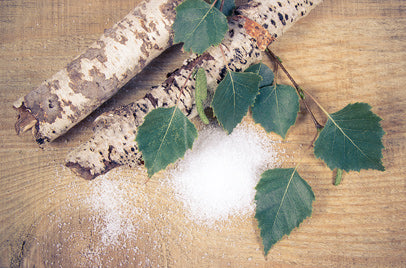Xylitol: A Sugar Alternative No-Brainer
Jayson Kroner
Sugar is rotting more than your teeth. It’s true. A tablespoon here, a few packets there. A cube or two with your afternoon tea. It adds up faster than you might imagine. And while satisfying the old sweet tooth is a pleasure that we’re all guilty of, it’s important to understand that consuming excessive amounts of sugars can do significant damage to more than just your smile.
Unfortunately, the problem doesn’t stop at table sugar. In fact, the most detrimental sugars are often hidden in popular processed foods and beverages. High fructose corn syrup (HFCS) is a perfect example. Made popular in the 1970’s, HCFS is commonly used in soda, jelly, candy, sauces, condiments, beer, cookies, breakfast cereals and many more. After a chemically-intense extraction and treatment process, all that remains is an extremely sweet, nutritionally depleted chemical that’s inexpensive to manufacture with an extremely high glycemic rating. Within the body, high glycemic sweeteners are among the most unfavourable, as they can reduce insulin sensitivity and encourage the body to store greater amounts of fat.
Thanks in part the mainstream media, the public has been made well aware of the influence sugar can have on tooth decay and weight gain. Still, diets high in sugar can lead to a number of health ailments that only seem to generate the attention they deserve after its too late.
In no particular order, excess sugar may …
* Cause headaches and migraines
* Decrease Vitamin E reserves
* Decrease the quality of vision
* Lower immune system response
* Cause hyperactivity in children
* Encourage LDL (bad) cholesterol
* Limit learning capacity
* Increase the symptoms of depression
* Prevent bowel movements
* Reduce sensitivity to insulin
* Damage human DNA structure
* Hinder the absorption of calcium/magnesium
* Cause hemorrhoids
* Prevent the release of growth hormone
* Lead to the formation of kidney stones
* Cause allergic reactions to certain foods
* Produce excess digestive tract acidity
* Alter the structure of protein
* Interfere with normal homeostasis
* Restrict enzymatic activity
* Increase fat content in the liver
* Increase fluid retention
* Lead to copper deficiency
* Promote sluggish digestion
* Debilitate adrenal gland function
Scary, isn’t it? What’s even more frightening is that most Americans have been left in the dark with regard to the damage that can be caused by regularly consuming excessive amounts of sugar. Don’t panic. Nature has blessed us with a host of natural sweeteners that can serve as much healthier alternatives. One of the most exciting of the bunch is xylitol, an all-natural sugar alcohol that was initially discovered in the 1800s. Only now, however, is it getting its due recognition. Let’s investigate.
If the name sounds familiar, it should. Xylitol has been the subject of intense study for close to 30 years, and the findings continue to prove that Xylitol is the real deal when it comes to sugar substitutes. For starters, xylitol looks, and has the same texture as sugar. Side by side, it would be practically impossible to distinguish one from the other. With regards to taste, it’s sweet, but not nearly as overpowering as the sugar we’ve grown accustomed to. Finally, it mixes instantly and has become a favorite in kitchens for baking and dessert preparation. Yet despite how similar this crystalline compound is to conventional sugar, it also possesses a number of interesting advantages.
One of the most notable is in its caloric value. Xylitol has approximately 40% fewer calories than regular table sugar. This is due to the slower pace at which xylitol is absorbed and partially utilized. At 2.4 calories per gram vs. 4 calories per gram in conventional sugar, it’s easy to see why xylitol has created such a stir among calorie counters. But that’s just the beginning. What makes xylitol genuinely unique lies in the long list of health benefits that have been demonstrated in numerous studies.
Unlike table sugar and HCFS, xylitol does not promote cavities. Studies have shown that when consumed in chewing gums, tooth pastes, oral rinses, mints and hard candies, Xylitol is a smart choice for individuals concerned with dental health. Moreover, Xylitol has received official endorsements from 6 International Dental Associations.
Another advantage of this natural, low calorie sugar alcohol is that the body does not metabolize xylitol in quite the same manner that it metabolizes sugar. Instead, xylitol is absorbed at a much slower rate, and as a result, does not cause blood sugar and insulin levels to spike in the fashion that conventional sugar does. Typically, the gylcemic index of sugar tops out near 100, while xylitol is closer to 7.
Our mouths, middle ear and upper respiratory systems are prone to a number of harmful infection-causing bacteria. One of the major problems with conventional sugar is that it can help these bacteria grow. Xylitol, on the other hand, can not be utilized by these bacteria. And unlike many commercially marketed artificial sweeteners, Xylitol is a completely natural substance that the body produces everyday. This deems it a completely safe alternative to conventional sugar for people of every age.
Health Disclaimer. Content provided by NOW Foods. Copyright ©2006-2023. Published with permission. Jayson Kroner is a health and fitness journalist, a certified sports nutritionist, and co-author of the book '7-Syndrome Healing.'
